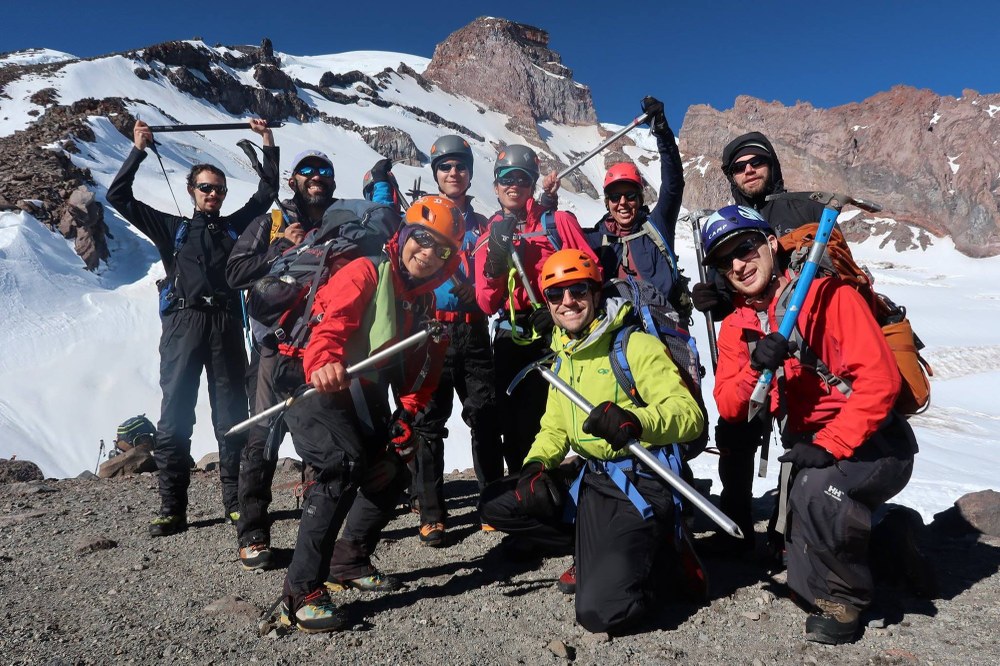
The Mountaineers is partnering with Colorado Mountain Club, the Mazamas, and the American Alpine Club to draft national standards that meet UIAA qualifications for our leader trainers. Beginning with scrambling, this cooperative of mountain clubs is tackling one skill set at a time. To date, we have begun work on Scrambling, Top Rope Climbing, Sport Climbing, and Single-Pitch Trad Climbing.
Each of these educator standards is drafted by a standards committee which includes volunteer and staff representatives from all organizations, plus folks acting in a “consulting” role from organizations like National Outdoor Leadership School (NOLS), Outward Bound, and the American Mountain Guide Association (AMGA).
Why are we doing this?
Like in Europe and Canada, as well as other parts of the world, our recreational climbing community is largely taught by volunteer clubs. While guide services play an important role in providing experiences and education, the volunteer mentorship model in our clubs has been a highly effective way of supporting a safe and welcoming climbing community for over a century.
Despite the obvious benefits of this model, many people involved in mountain clubs have experienced areas of inconsistency, examples of antiquated techniques still in use, and instances where the experience is not as welcoming as it should be.
Not surprisingly, these concerns are similar around the world, and in 2008, the UIAA began a conversation about ways to apply international standards to leader training and qualifications. The Mountain Qualification Label (MQL) program was released internationally in 2012 to provide a framework for federated members in each country to develop training standards that both meet international standards and respond to local needs and structures.
The American Alpine Club (AAC) is the US federated member of the UIAA, and in 2016, The Mountaineers, The Colorado Mountain Club, and the Mazamas began working with them to develop national standards.
We are excited about the potential benefits of this project:
- As more trainers in the founding and smaller mountain clubs become certified, the consistency in quality of training and inclusiveness of the climbing environment will improve
- The UIAA MQL program will provide our volunteer instructors opportunities to advance their skills and experience, and to be recognized as top trainers.
- Because this certification is national, it is also transferable. While each club will likely require an additional equivalency process, a certified climbing educator who moves from Seattle to Colorado will have an easier time getting connected at the CMC, and vice versa.
- Certified instructors will become part of a vibrant international learning community, with resources to stay connected to new and cutting edge methodology.
- Participation will strengthen the climbing community among the regional climbing clubs, becoming more vibrant and cohesive.
The process
Step 1 - Drafting
Each standard is drafted over a weekend by a group of 15-20 representatives from The Mountaineers, The Mazamas, Colorado Mountain Club, the American Alpine Club, and a handful of others acting as consultants, like NOLS or the AMGA. This group includes volunteers as well as staff.
Step 2 - Feedback
Once the draft is ready, meaning it's about 90% done and will work for all clubs involved, it gets circulated among the respective clubs for additional input. At The Mountaineers, we start this feedback process at the Climbing Summit.
In most cases, the feedback tends to be similar across clubs. In the rare case when one club feels that a change needs to be made that changes things for another club, we spend more time working on editing the standard so that it can apply nationally.
Step 3 - Implementation Pilot
Once the draft standard is complete, each organization will put together an Implementation Team - a group of volunteers who already meet the standard and who can pilot an implementation process.
Throughout, the standards committee that drafted the standard will stay connected so that we can learn about the hiccups that arise at each organization, providing feedback along the way. Ideally, each organization's implementation process will look similar.
Step 4 - Audit
Once clubs have piloted an implementation process and tweaked it as needed, the AAC will contact the UIAA to conduct an audit. This is the step that gives our program an international accreditation.
Implementation at The mountaineers
These standards are designed for all of the clubs as aspirational certifications – something beyond instructor and leader: Trainer. Those leaders who are also outstanding teachers and mentors will qualify for this certification. It will allow our clubs to recognize another tier of leadership, and it will drive a leadership development track for those volunteers who are excited about continuing to expand their skill set as leaders and trainers.
This fall and winter, we will pilot the implementation of our Mountain Educator Standard. This is a standard designed for our top scramble mentors.
Will I get a badge? Obviously! But perhaps even more valuable is the opportunity to become part of a national (and international) community of top scramble and climbing educators. The Mountaineers is covering the costs for our leaders to receive this international certification. You'll have the option to receive special AAC updates on new technology and methodology, helping you continue to improve your skills as a trainer. You'll also be recognized by your up-and-coming leaders, by The Mountaineers, and by the rest of the volunteer mountain clubs as a key resource.
 The Mountaineers
The Mountaineers